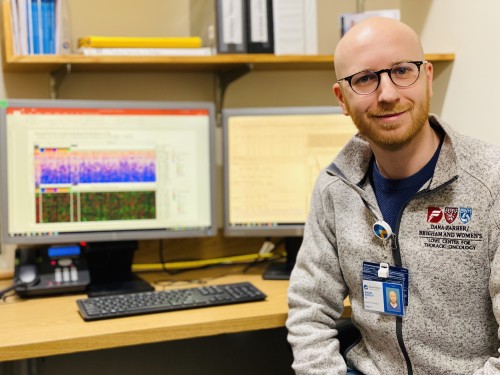
With the support of the ILCF, we have demonstrated that a genomically defined subset of lung cancers
harboring mutations in genes involved in DNA damage repair (DDR) derive improved clinical outcomes
with PD-(L)1 blockade.
What Inspired you to focus your career on thoracic oncology?
During my medical training, I witnessed the cancer immunotherapy revolution and I gained an early appreciation for how basic and translational immunology research deeply impacted the lives of patients and their family members.
Unfortunately, throughout my residency and my fellowship in medical oncology, I have also met patients with lung cancer who did not respond to immunotherapy. This made me quickly recognize the urgent need for more translational research in thoracic immuno-oncology.
How has receiving an ILCF Research Award contributed to the advancement of your research?
With the support of the ILCF, we have demonstrated that a genomically defined subset of lung cancers harboring mutations in genes involved in DNA damage repair (DDR) derive improved clinical outcomes with PD-(L)1 blockade. The results of our proposal will hopefully help in guiding treatment decisions and will also help to rationally design novel immunotherapy clinical trials. In addition, because mutations in DDR genes are increasingly being identified in other tumor types, our findings could extend to other cancers in which immunotherapies are already making a substantial impact.
What are the next steps of your research? Of your career?
My ultimate goal is to become an independent investigator focusing on the genomic determinants of response and resistance to PD-(L)1 blockade in non-small cell lung cancer. I also plan to resume my clinical activity as a medical oncologist in the United States.
How are your next steps influenced by the outcomes of the project funded by your ILCF Research Grant?
This fellowship provided a tremendous opportunity for me to meet other young scientists and to further develop my skills as a translational researcher at the start of my academic career as I seek to find new biomarkers of response and resistance to immunotherapies. Based on the results obtained by completing our proposal, we are now focusing on dissecting the clinicopathologic, genomic, and immunophenotypic correlates of ATM mutation (the most commonly mutated DDR gene in lung cancer). Thanks to the support of the ILCF I have also successfully applied for additional funding from the Society for Immunotherapy of Cancer, which will help us to better understand the genomic mechanisms underlying the sensitivity and resistance to immunotherapies in lung cancer.
Who is your primary mentor? What makes your relationship with your mentor meaningful to you?
My primary mentor is Dr. Mark M. Awad, who is the Clinical Director of the Lowe Center for Thoracic Oncology at the Dana-Farber Cancer Institute, and Assistant Professor at Harvard Medical School. Dr. Awad is a caring, generous, creative, and hard-working advisor. Since the first day I met him, I became acutely aware of his great knowledge and skills as well as the endless hours he worked in an effort to help his patients in their struggle against lung cancer. Receiving the ILCF Fellowship Grant recognized Dr. Awad's deepest commitment to help and support young fellows and investigators as they start their academic career.
What are some of your passions outside of work?
I play the guitar and I am passionate about outdoor activities, such as hiking and trekking.
